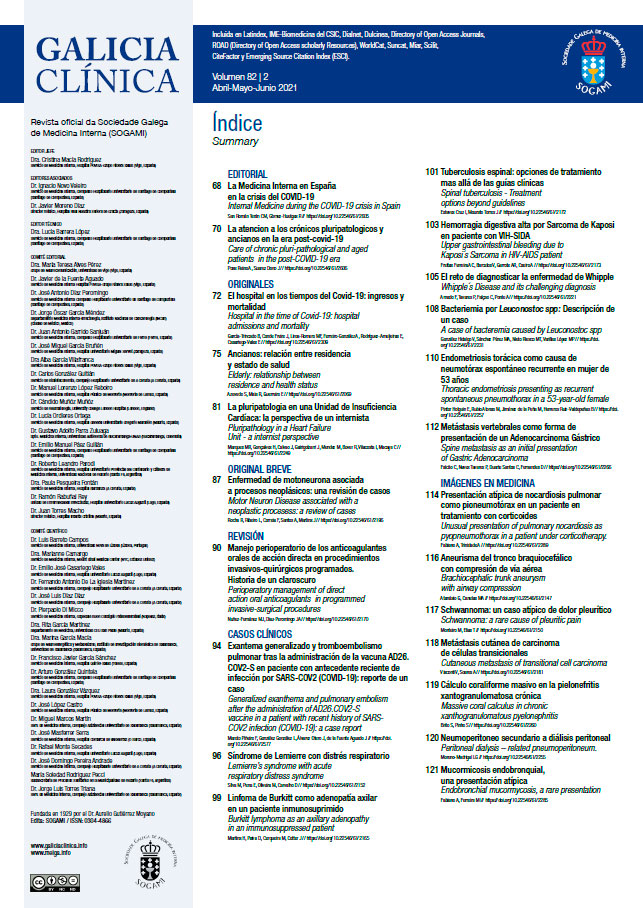Galicia Clínica by Sociedad Gallega de Medicina Interna is licensed under a Creative Commons Reconocimiento-NoComercial-SinObraDerivada 4.0 Internacional License.
Created from galiciaclinica.info.
Similar Articles
- Jesús Conde Freire, Beatriz Garcia Trincado, David Rubal Bran, Pablo Ventura Valcárcel, Hector Guerrero Sande, Elena Rodríguez Ameijeriras, Manuel Francisco Liroa Romero, María Matesanz Fernández, Iria Íñiguez Vázquez, Emilio Casariego Vales, HOSPITAL IN THE TIME OF COVID-19: SURGE AND ADAPTIVE CAPACITIES , Galicia Clínica: Vol. 82 No. 1 (2021): Galicia Clinica - Official Journal of the SOGAMI
- Catarina Negrão, Carolina da Silva Alves, Rita Sismeiro, Leonor Boavida, Ricardo Paquete Oliveira, Sofia Furtado, Marta Jonet, The Impact of COVID-19 Pandemic on New Active Tuberculosis in Hospitalized Patients , Galicia Clínica: Vol. 84 No. 4 (2024): Galicia Clinica - Official Journal of the SOGAMI
- Adela Lama López, Lung Ultrasound for COVID-19 prognosis a unique experience on elderly patients , Galicia Clínica: Vol. 85 No. 3 (2024): Galicia Clinica - Official Journal of the SOGAMI
- JESUS CONDE FREIRE, ANTIA PEREZ LOPEZ, ANA RODRIGUEZ ALVAREZ, CRISTINA GIL MOURE, ELENA RODRIGUEZ AMEIJEIRAS, MANUEL FRANCISCO LIROA ROMERO, MERCEDES BAL ALVARADO, EMILIO CASARIEGO VALES, COVID 19 PANDEMIC: OTHER CONSEQUENCES , Galicia Clínica: Vol. 82 No. 1 (2021): Galicia Clinica - Official Journal of the SOGAMI
- PAULA LUQUE LINERO, LUIS CASTILLA-GUERRA, TERESA ARROBAS VELILLA, ANA FERNANDEZ-PALACIN, EDUARDO CARMONA NIMO, MIGUEL ANGEL RICO CORRAL, RE THE CARDIOVASCULAR RISK FACTORS AN UNFAVOURABLE PROGNOSIS FOR COVID-19 PATIENTS? , Galicia Clínica: Vol. 85 No. 2 (2024): Galicia Clinica - Official Journal of the SOGAMI
- Miguel Silva, Eduarda Pena, Margarida Oliveira, Daniela Carvalho, Lemierre's syndrome with acute respiratory distress syndrome , Galicia Clínica: Vol. 82 No. 2 (2021): Galicia Clinica - Official Journal of the SOGAMI
- Joana Diogo, Carolina Coelho, Rita Monteiro, Ângela Ghiletchi, Vasculitis IgA que afecta a cuatro sistemas , Galicia Clínica: Vol. 83 No. 4 (2022): Galicia Clinica - Official Journal of the SOGAMI
- Blanca Ayuso-García, María J Gude-González, Antía Pérez-López, Yoana Besteiro-Balado, Cristina Pedrosa-Fraga, Nagore Blanco-Cid, María M Magariños-Losada, Eva Romay Lema, Assessment of hospitalized covid-19 patients two month after discharge: characterization of persistent symptoms. , Galicia Clínica: Vol. 82 No. 4 (2021): Galicia Clinica - Official Journal of the SOGAMI
- Maria João Palavras, Cátia Faria, Margarida Cabral, Flávia Santos, Joana Gonçalves, Ana Maria Araújo, Luís Pereira, Validity of APACHE II and SAPS II scores as predictors of early global mortality at 3 months from sepsis , Galicia Clínica: Vol. 82 No. 3 (2021): Galicia Clinica - Official Journal of the SOGAMI
- Telmo Coelho, João Miranda, Raquel Moura, Paula Ferreira, Autoimmune Haemolytic Anaemia After Covid 19 Infection , Galicia Clínica: Vol. 84 No. 2 (2023): Galicia Clinica - Official Journal of the SOGAMI
You may also start an advanced similarity search for this article.
Most read articles by the same author(s)
- JESUS CONDE FREIRE, ANTIA PEREZ LOPEZ, ANA RODRIGUEZ ALVAREZ, CRISTINA GIL MOURE, ELENA RODRIGUEZ AMEIJEIRAS, MANUEL FRANCISCO LIROA ROMERO, MERCEDES BAL ALVARADO, EMILIO CASARIEGO VALES, COVID 19 PANDEMIC: OTHER CONSEQUENCES , Galicia Clínica: Vol. 82 No. 1 (2021): Galicia Clinica - Official Journal of the SOGAMI
- Manuel Francisco Liroa Romero, Beatriz García Trincado, Eva María Romay Lema, NECROSIS OF FEET AND HANDS IN THE SEPTIC SHOCK BY KLEBSIELLA PNEUMONIAE. , Galicia Clínica: Vol. 82 No. 1 (2021): Galicia Clinica - Official Journal of the SOGAMI
- Jesús Conde Freire, Beatriz Garcia Trincado, David Rubal Bran, Pablo Ventura Valcárcel, Hector Guerrero Sande, Elena Rodríguez Ameijeriras, Manuel Francisco Liroa Romero, María Matesanz Fernández, Iria Íñiguez Vázquez, Emilio Casariego Vales, HOSPITAL IN THE TIME OF COVID-19: SURGE AND ADAPTIVE CAPACITIES , Galicia Clínica: Vol. 82 No. 1 (2021): Galicia Clinica - Official Journal of the SOGAMI
- MANUEL FRANCISCO LIROA ROMERO, BEATRIZ GARCÍA TRINCADO, MANUEL LOUREIRO MARTÍNEZ, RAMON RABUÑAL REY, 41-YEAR-OLD WOMAN WITH SKIN LESIONS , Galicia Clínica: Vol. 81 No. 3 (2020): Galicia Clinica - Official Journal of the SOGAMI
- CRISTINA PEDROSA FRAGA, JUAN CARLOS PIÑEIRO FERNÁNDEZ, SANTIAGO TABOADA RIVAS, BEATRIZ GARCÍA TRINCADO, Paraneoplastic dermatomyositis: report of two cases , Galicia Clínica: Vol. 82 No. 4 (2021): Galicia Clinica - Official Journal of the SOGAMI
- Beatriz García Trincado, Francisco Terrón Pérez, Fahr´s disease , Galicia Clínica: Vol. 78 No. 1 (2017): Galicia Clinica - Official Journal of the SOGAMI


